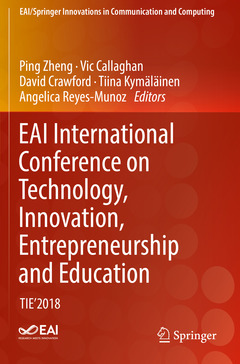Description
EAI International Conference on Technology, Innovation, Entrepreneurship and Education, 1st ed. 2020
TIE'2018
EAI/Springer Innovations in Communication and Computing Series
Coordinators: Zheng Ping, Callaghan Vic, Crawford David, Kymäläinen Tiina, Reyes-Munoz Angelica
Language: English
Subjects for EAI International Conference on Technology, Innovation...:
Publication date: 08-2020
198 p. · 15.5x23.5 cm · Paperback
Publication date: 06-2019
198 p. · 15.5x23.5 cm · Hardback
Description
/li>Contents
/li>Biography
/li>Comment
/li>
This book presents the proceedings of the 2nd EAI International Conference on Technology, Innovation, Entrepreneurship and Education (TIE' 2018), which took place at Ravensbourne University London, London, UK, on September 4, 2018. The central theme of the conference is emerging technologies in relation to business, education, social and political needs that make modern society flourish. The proceedings feature papers from a cross-disciplinary audience that explore the process of creativity and innovation. The goal is that the various disciplines can learn from each other and see how they might benefit from the cross-fertilization of practices.
Ping Zheng was awarded her Ph.D. in Management from University of Kent (UK) in 2007, after completing an MBA with distinction at the same school in 2003. Before embarking on an academic career, she worked as executive manager for number of years in a US-owned joint venture developing business relations between US and China. She is currently a Senior Lecturer at Canterbury Christ Church University Business School in the UK. Prior to this she was a Lecturer at Essex Business School of University of Essex from 2006 to 2010. Her research interests range from entrepreneurship and innovation in SMEs to institutional change and firm growth strategies in emerging economies. She has published on a numerous journals, such as Journal of General Management, Thunderbird International Business Review, Futures. She received the “Best Paper Award” at the Institute for Small Business and Entrepreneurship (ISBE) Annual Conference in 2010. She is also the principal author (with Prof. Richard Scase) of a book (research monograph) - “Emerging Business Ventures under Market Socialism: Entrepreneurship in China” (Routledge, London, 2014). Her recent book chapter adopts a novel future perspective in analyzing the possible future outcome of technological change, 'How change agencies can affect our path towards a signgularity' is published by Springer.
Tiina Kymäläinen has been working as a research scientist at VTT Technical Research Centre of Finland (Ltd) since 1999, where she has been studying emerging technologies – ubiquitous computing, intelligent environments and, most recently, Internet of Things – from the human-driven, design-oriented perspective. At the current researchteam, her core responsibilities are in user-centred design, user experience design, design-oriented research employing participatory methods and future-oriented design.
David Crawford has been working as a Professor at the University of Essex at Colchester, lectur

